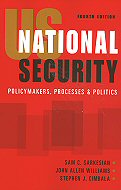US National Security:
Policymakers, Processes & Politics - Fourth Edition
|
Sam C. Sarkesian,
John Allen Williams, Stephen J. Cimbala
|

|

From the Preface
Assessing the international context and issues of US national security in the twenty-first century, we conclude that much of what we wrote more than ten years ago remains relevant today. Nonetheless, the new era has created a strategic landscape that requires a rethinking of US national security, particularly with respect to international terrorism and homeland security. Any study of US national interests must encompass questions of values and interests about unconventional conflict. The involvement of the US military in operations short of war (such as low-intensity conflict and peacekeeping missions) has become commonplace. This development has complicated the relationship of policy, strategy, national interests, and the use of force, and it highlights the need for an expanded and effective intelligence apparatus. All of this is even more complicated by the impact of globalization, the information age, and the myriad uses of cyberspace.
The main themes and reference points in the third edition remain relevant and served as the basis for this edition. We have assessed the new era, however, and examine how the challenges in the past years have magnified and complicated those themes and reference points. Our focus remains the same: how the national security system works and its effectiveness in responding to current and future global challenges.
We address these matters by examining the following questions: How relevant are the institutions of the national security establishment in responding to the strategic landscape of the twenty-first century? How well do they function? How do those in the national security system assess the international strategic landscape? What is the US grand strategy and policy for twenty-first century? What role does public opinion play in US national security policy? And particularly important, what are the US national interests that must form the basis of national security policy? […]
|
|
